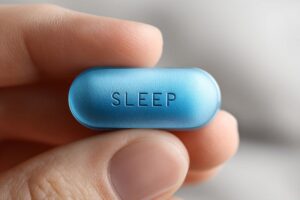
Sleep apnea is one of the most common sleep disorders. It can rob you of precious rest and leave you feeling drained day after day. In an effort to get more sleep, you might be tempted to start taking sleeping pills, especially if your sleep apnea is accompanied by bouts of insomnia. While pills might help you fall asleep, taking them is not a good idea if you have sleep apnea! This blog post explains why.
How Sleeping Pills Work
Sleeping pills are designed to induce sleep or prolong its duration. These medications typically affect the central nervous system, altering the signals in the brain that control wakefulness and drowsiness.
Most sleeping pills are intended for short-term use and are typically prescribed to help individuals with acute insomnia or temporary disruptions to their sleep schedule. Although these medications can provide relief from sleepless nights, they do not address the underlying causes of disturbed sleep. Moreover, for people with sleep apnea, using sleeping pills can actually create new risks.
Sleeping Pills and Obstructive Sleep Apnea
Obstructive sleep apnea (OSA) is a condition in which the muscles at the back of the throat relax too much during sleep, causing a temporary blockage of the airway. This leads to repeated pauses in breathing, which can last from a few seconds to over a minute. These interruptions fragment your sleep and reduce the oxygen levels in your blood.
Using sleeping pills when you have OSA is generally not recommended for a few reasons:
- Sleeping pills relax the muscles of the body, including those in the throat and upper airway, which can worsen the airway obstruction that characterizes sleep apnea.
- Deeper or more prolonged sleep caused by medication may reduce your body’s natural arousal response, making it less likely that you will wake up when your breathing is compromised. This increases the risk of longer and more severe apnea episodes.
- Individuals with sleep apnea who use sleeping pills may be at a higher risk of serious complications, such as low blood oxygen, cardiovascular events, and excessive daytime drowsiness.
Other Strategies to Help You Get More Rest
Since sleeping pills are not a great solution for individuals with sleep apnea, you might need to explore other strategies that can help you get more high-quality sleep:
- Adhere to prescribed therapies: Use your oral appliance or other sleep apnea treatment as directed. These devices help keep your airway open during sleep and significantly reduce sleep apnea episodes.
- Practice good sleep hygiene: Create a relaxing bedtime routine, avoid screens for at least an hour before sleep, and keep your sleeping environment cool, dark, and quiet.
- Limit stimulants and alcohol: Avoid caffeine and alcohol in the hours leading up to bedtime, as these substances can interfere with both sleep quality and breathing.
- Exercise regularly: Engage in physical activity during the day to help promote deeper, more restful sleep at night. Be sure to finish vigorous exercise several hours before bedtime.
- Seek treatment for insomnia. If you struggle to fall asleep, you might need care from a mental health professional or another qualified care provider.
Sleeping pills are not an effective sleep apnea treatment! Try other methods to help you fall asleep and stay asleep.
Meet the Practice
Drs. Joyce and John Warwick are proud to provide top-quality sleep apnea treatment for the Pittsburgh community. Our practice provides convenient at-home sleep testing and treatment in the form of custom oral appliances. If you would like to speak to us about how you may be able to get better sleep, contact Warwick Dentistry at 412-391-1130.

